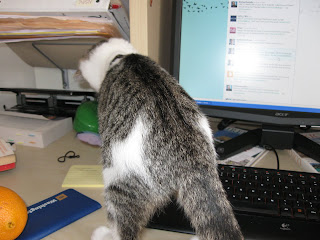I'm back and I'm much less fussy. I apologize for my last post. I was feeling pretty foul.
The reality of the PhD process is that there are some bad days. In speaking with some close friends, who are also members of my cohort, we concluded that a lot of this process is....humiliating, for lack of a better word.
Before my last post, it was requested that I write up a proposal as a part of my attempt to gain access to one of the datasets that I am interested in using for my dissertation. I made my best attempt at doing that, and got some criticism in return. It happens and it is good for me. Usually, I take criticism well, especially if it is constructive and from someone with an expertise in that area, which this was. Additionally, it wasn't mean-spirited or nit-picky. I think what made it sting more than it should have was that the response wasn't just sent to me, but to a few other people as well. Having spent some time reflecting on this, and having had some further interaction with everybody, I really think that nothing negative was intended. And, they certainly haven't said that I can't have access, so....
It was also a good reminder that science isn't a private endeavor. We don't want it to be. Good science is performed in the open, so that it can be commented upon, improved upon and done well. (However, since I work in a topic area that can be contentious, I would like to clarify that it is our
peers in the scientific community, not just anybody, who should be commenting on the science. Ethical considerations are, of course, open to all....)
On another note, I want to talk briefly about some common sense things I've learned over the last year regarding publications. First, if you work on it, try to get your name on it. I know that may seem pretty basic. And before this week, I would have laughed at the suggestion that I would be so foolish as to work on something and not be a named author. Alas, irony is cruel.
Remember my mother's saying (paraphrasing someone named Brandon Mull), "Smart people learn from their mistakes. Brilliant people learn from the mistakes of others." Be brilliant, learn from the people who have gone before.
Next, if you are getting funding from some entity, that funding must be mentioned in the publication. I was informed of this by the agency that funds me, and I have been careful to stress that my funding must be mentioned to the publishers of my (very few, but hopefully, soon to be greater in number) articles. I would not have known this, though, unless someone had told me.
Finally, use a citation software when you write articles. I am not going to name one because they all have flaws, and I'm not completely satisfied with any that I've tried. They are, however, really, really important if you write something and then need to change the citation style. Also, if you use it as you're writing, which is what I do, the program is able to organize your reference list and store your references for future papers. I tend to write things in APA format since that's what I used in both my undergraduate and master's program. However, I've had to submit papers in numbered notation and without the software, I would have had to go back and do that by hand. Which would have been really a bad experience. So, use something. For your own sanity.
School starts next week! I'm nervous and excited and completely amazed that I'm already starting the second year. To all readers who are starting programs this fall, I send you all of my hope that you will have as wonderful a first year as I did!!!


